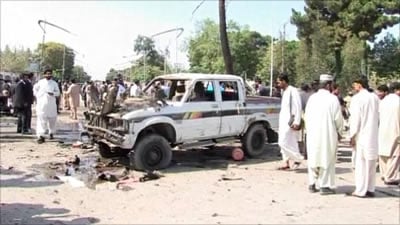
What is more important: Securing Pakistan’s strategic relationship with the United States or asking what some may call the “tough questions”? The presence of Osama bin Laden in the country’s garrison town of Abbottabad may not have been in the knowledge of the top Pakistani military authorities but it is no coincidence that many other Al-Qaeda leaders still continue to hide inside Pakistan.
This week, the Pakistani secret services and the Frontier Corps (FC) acted only when the American intelligence sources urged Islamabad to take action against a key Al-Qaeda leader Younis al- Mauritani whom the organization’s slain chief Osama bin Laden had entrusted the responsibility of targeting the economic interests of the United States, Europe and Australia.
Al- Mauritani was incarcerated from Quetta, the capital of the largest Balochistan province, with two other associates. For many years, the Afghan and American governments had been urging the Pakistanis to take action against the rogue Quetta Shura which is headed by Taliban’s spiritual leader Mullah Omar. The Shura presumably moved to Quetta soon after the exit of Taliban from power in 2002. Since then, Pakistan has denied the presence of key Taliban or Al-Qaeda leaders in Quetta. When the US administration became impatient with Pakistan’s lack of cooperation, it threatened to extend the drone strikes to Balochistan.
The recent developments have come at a time when the Pakistani army is still striving to recover from the embarrassment caused by the killing of bin Laden from its backyard. At the moment, the Pakistanis are in a weak position. Instead of provoking the United States to ask the tough question as to why Al-Qaeda leaders still find Pakistan a safe heaven, they prefer to comply with demands to take action against some of the leaders to remind that they have not fully unsubscribed to the war on terror.
Many in Pakistan call the war on terror as “America’s war”.
The recent arrests of three Al-Qaeda operatives is a delayed move to restore trust and repair almost broken ties between Islamabad and Washington. The United States and Pakistan will require a lot to restore mutual confidence and trust to continue to cooperate as partners. The Americans are still clung with the hope that Pakistan will one day provide a truthful and honest account about Osama bin Laden’s presence in Abbottabad. On their part, the Pakistanis strongly feel unappreciated by the Americans for whatever cooperation they offer to fight extremism. There is extraordinary resentment toward the drone strikes which the Americans argue target Al-Qaeda terrorists while the Pakistanis criticize for civilian causalities.
What we don’t know with certainty, at this point, how many more Al-Qaeda leaders are still hiding in Pakistan.
The Tehreek-e-Taliban Pakistan (TTP), the Pakistani version of Taliban connected to Al-Qaeda, avenged Monday’s arrests of three Al-Qaeda leaders with two massive suicide bomb blasts in Quetta. A twenty-one year old young Afghan national, as reported by the Pakistani officials, attacked the residence of a senior officer of the Frontier Corps (FC), which carried out the raid to detain Younis al- Mauritani, killing more than twenty people.
“The attack [which killed a top colonel of the FC and the wife of a senior officer] was intended to punish the FC for taking action against “our Mujahid brothers,” said a TTP spokesman.
The battle against Al-Qaeda continues as we prepare to mark the one decade anniversary of the tragic events of 9/11. While the Afghans were almost prepared to face the heat of the post-Taliban era, Pakistanis, on the other hand, had never predicated such a deadly fallout of the war on their land. They are very well-versed in providing statistics about the number of murdered civilians; drone strikes and the description of major terrorist events which rocked their country since 9/11. The Pakistani military, after ten years of deliberations, is still not fully convinced if there is a world without ‘good Taliban” .
They await for the US forces to withdraw from Afghanistan in 2014. Afterwards, Pakistan seems confident that at least the “good Taliban” from these Islamic groups will eventually become its friends and agree to cooperate to counter any direct Indian influence in Afghanistan.